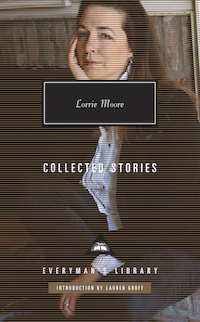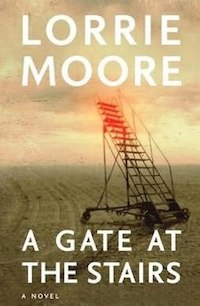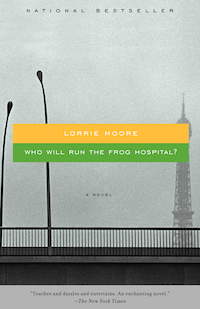An Interview with Lorrie Moore
by Andrew Koenig
Lorrie Moore is the author of multiple short story collections and three novels, Anagrams, A Gate at the Stairs, and Who Will Run the Frog Hospital? Currently the Gertrude Conaway Vanderbilt Professor of English at Vanderbilt University, she taught at the University of Wisconsin for nearly thirty years. In this conversation with Harvard Review book review editor Andrew Koenig, she talks about the recent publication of her Collected Stories, as well as the challenges of writing during a pandemic.
Andrew Koenig: Last year your collected stories were published by Everyman’s Library. What was it like to see them as a compilation? Did the stories feel different to you when presented in this way? Did you notice continuities or running themes? Also, I was curious to see them alphabetized, rather than organized by year or by the collection they were originally published in, and to see this author’s note: “Attempting to glimpse the growth of an author through chronological arrangement is, in my opinion, often a fool’s errand and even if possible and successful is somewhat embarrassing to the young author who remains alive within the older one.” Why present them A–Z?
 Lorrie Moore: It felt a little posthumous, I guess, and the photo looks like Edith Wharton’s insufferable grandniece, though I’m happy to say I’ve written one additional story since then, which is not in the Collected—evidence that my writing life goes on. I didn’t notice continuities or running themes because I didn’t proofread the galleys as I was supposed to. I kept postponing it and told the publisher I would get to it very soon, and then I got an email that said, “Too late! The books have to be printed in Germany, and that ship has sailed.” As for the sequence, I love alphabetizing anything. And a library should be alphabetized. (It’s fun in my own shelves to see Charles Portis next to Katherine Anne Porter, etc.) I imagined alphabetizing would put stories next to one another that had never been adjacent, close, or even formally introduced before. Perhaps new sparky conversations would occur. Also, alphabetizing makes things simple to find by title.
Lorrie Moore: It felt a little posthumous, I guess, and the photo looks like Edith Wharton’s insufferable grandniece, though I’m happy to say I’ve written one additional story since then, which is not in the Collected—evidence that my writing life goes on. I didn’t notice continuities or running themes because I didn’t proofread the galleys as I was supposed to. I kept postponing it and told the publisher I would get to it very soon, and then I got an email that said, “Too late! The books have to be printed in Germany, and that ship has sailed.” As for the sequence, I love alphabetizing anything. And a library should be alphabetized. (It’s fun in my own shelves to see Charles Portis next to Katherine Anne Porter, etc.) I imagined alphabetizing would put stories next to one another that had never been adjacent, close, or even formally introduced before. Perhaps new sparky conversations would occur. Also, alphabetizing makes things simple to find by title.
AK: So often short stories are treated as discrete units. What is the significance of the short story collection as a form for you? How much does it matter to you where the stories fall in a particular collection? Is this something you stress in your teaching?
LM: My students are very interested in the collection as a form. I’m not interested in that. I am only interested in each story itself, and I worry about any compromise to a story’s integrity that’s performed to make it “fit” into a collection. Now a novel-in-stories is a different matter, and one must then concern oneself with stories as chapters.
AK: The use of the second-person has been important in your work. Nowadays it’s especially common in online writing. What impact has (or hasn’t) the Web had on the speech tics and thinking patterns of your characters? Is it something you purposely incorporate or avoid?
LM: I haven’t used the second person in close to forty years. But, yes, I sometimes get original gangster credit/blame for it. This was long before the Internet, when the second person was associated with poems, letters, diaries. I liked the subjectless syntax of the imperative: it’s a very streamlined sentence. But I am not an authority on speech tics acquired from the Web. I have been in a roomful of people over sixty and heard someone exclaim “OMG” or “WTF”—the actual letters, I mean. It’s amusing but alarming too to witness in people that age. I’m sure that’s not what you’re asking. I’m sure you’re asking about social media. But I don’t do social media so I don’t spend much time there so it is really not an influence. It looks to me from a distance to be a terrible time-suck and somewhat psychically damaging to children.
 AK: How do you go about picking places to set your stories? Is the location of the story something you decide on first, before the writing? I’m thinking particularly of A Gate at the Stairs, where the Midwestern college town setting seems almost like a character in its own right. It’s hard for me to imagine the story taking place anywhere else. Is place always this crucial to your fiction?
AK: How do you go about picking places to set your stories? Is the location of the story something you decide on first, before the writing? I’m thinking particularly of A Gate at the Stairs, where the Midwestern college town setting seems almost like a character in its own right. It’s hard for me to imagine the story taking place anywhere else. Is place always this crucial to your fiction?
LM: Place was not always crucial, but it was in my last two novels. My first novel was in a kind of American placelessness. But I wanted landscape and weather and regional thisses and thats to be part of my last two. So, yes. I wanted to include in A Gate at the Stairs all the things one might not ordinarily associate with Wisconsin (though I never use the word Wisconsin). I was interested in elements and features that I noticed when I first moved there and also how the national culture situated itself there, transforming various local elements, farm-to-table restaurants, for instance, or the psychic estrangement of young men who are then vulnerable to being recruited for dubious international projects.
AK: Who Will Run the Frog Hospital? also raises for me the question of setting—in this case, it alternates between a small town in upstate New York in the sixties and post-Cold War Paris. You have said you don’t consider your work autobiographical. Does writing about the place you’re from change that equation at all?
 LK: Oh, there are a few autobiographical things, but every aspect is transformed and re-contextualized. I wanted to write about the small tourist-town aspect of the Adirondacks, and I made the character my own age in 1972 so I would already know all the pop songs of the time and not have to do much research.
LK: Oh, there are a few autobiographical things, but every aspect is transformed and re-contextualized. I wanted to write about the small tourist-town aspect of the Adirondacks, and I made the character my own age in 1972 so I would already know all the pop songs of the time and not have to do much research.
AK: How has the pandemic affected your writing? Do you find yourself gravitating towards new themes as we go through this period of intense isolation (and now, reemergence)?
LM: I did write one story prompted by the death of my father by Covid. Watching him die so alone just broke my heart. And a broken heart of course is often where writing comes from.
AK: Putting a fresh spin on the obligatory “what’s on your nightstand” question: what do you wish you were reading more of? What books or sorts of books do you find yourself returning to right now?
LM: I love more than ever for some reason just simply to read, and have started to see it as necessary preparation for writing when probably it is mostly just avoidance of writing. Writing should be giving yourself the thing you want to read. But there’s lots I already want to read. This year some of the best things I read included Ayad Akhtar’s terrifically blistering Homeland Elegies and Colson Whitehead’s heart-searing The Nickel Boys. These are intrepid books. I’m finishing up Rachel Cusk’s enigmatic new novel. I am interested in her use of paraphrase and how it festoons her narrative sometimes rather than advances it, as well as her fascination with D. H. Lawrence, which I share.
AK: Lastly, what are you working on at the moment?
LM: I am working on a novel, which I hope to finish by year’s end. Ha ha ha! We’ll see.
Lorrie Moore’s Collected Stories is out now from Everyman’s Library.
Published on July 22, 2021

